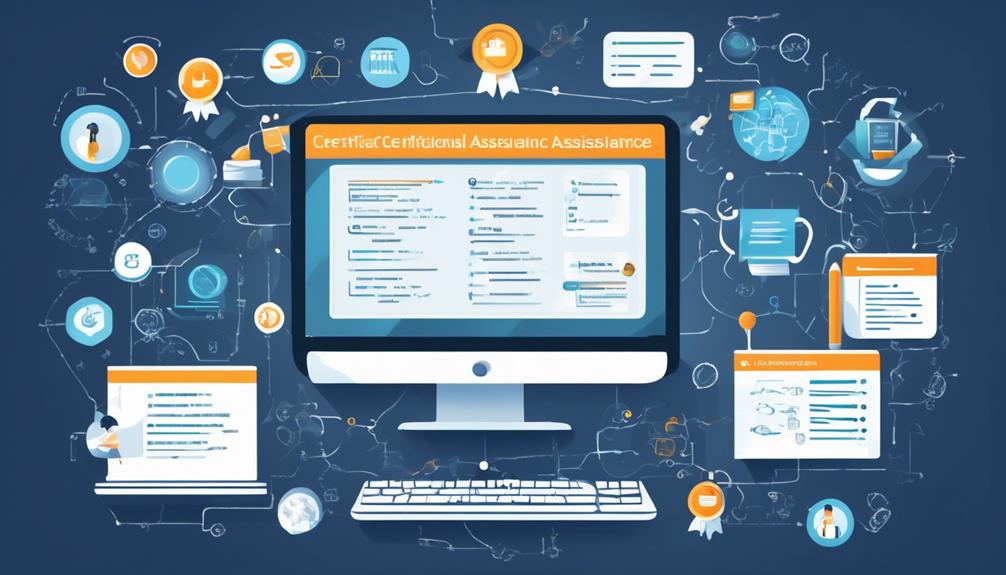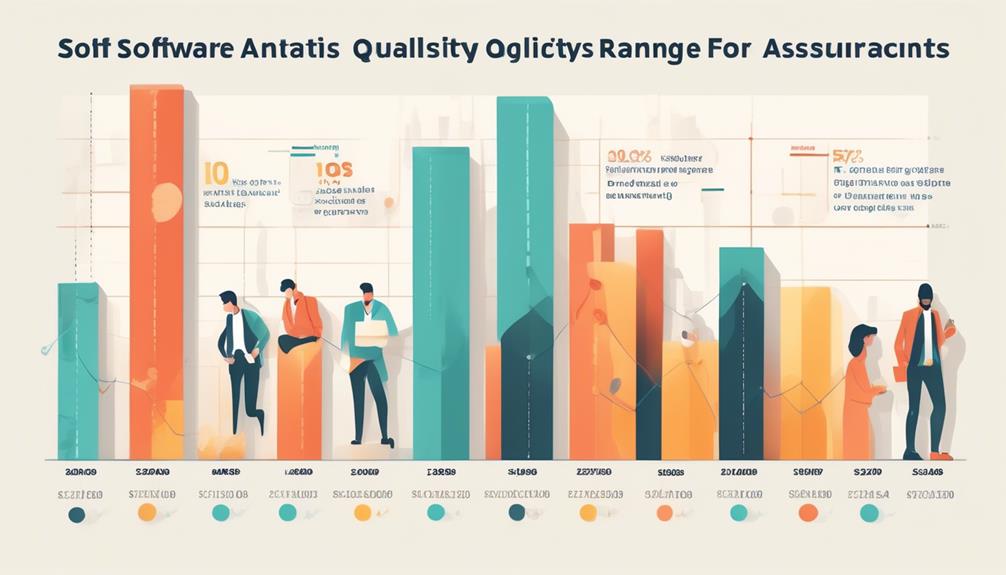As you traverse the intricate realm of technology, envision yourself as the watchful guardian of digital integrity, meticulously analyzing every line of code to pinpoint any potential flaws.
But how does one embark on this journey to become a Software Quality Assurance Analyst, you may wonder? Well, the path is not without its challenges, but with the right guidance and determination, it is entirely achievable.
From the essential educational requirements to the intricate web of certifications and skills, the roadmap to this career is both fascinating and complex.
Key Takeaways
- A bachelor's degree in computer science or a related field is typically required to become a software quality assurance analyst, with a master's degree in data analytics being beneficial for advanced roles.
- Ongoing education and certifications, such as the Data Analyst and Nanodegree from Udacity, CompTIA A+, CompTIA Network+, and CompTIA Project+, are recommended to stay updated in the field and enhance career prospects.
- Strong analytical mindset, attention to detail, and deep understanding of testing methodologies and tools are essential skills for success in this role.
- Software quality assurance analysts have a promising job outlook, with a competitive salary and high demand across various industries. There is also ample opportunity for career growth and advancement through gaining experience, obtaining additional certifications, networking, and pursuing further education.
Job Description and Responsibilities
As Software Quality Assurance Analysts, we rigorously test software to identify and rectify bugs, ensuring a seamless user experience. Our role involves documenting and reporting bugs to software development teams, compiling databases of reports and software issues, conducting research, and preparing testing plans.
We're responsible for making recommendations for product improvements, ensuring that the software meets the highest quality standards. Quality assurance analysts play a crucial role in the development process, as we're the final gatekeepers before the software is released to the end-users. Our jobs require a meticulous attention to detail, methodical testing methods, and an analytical mindset to uncover even the most elusive bugs.
A career as a software quality assurance analyst typically requires a degree in computer science or a related field, as well as a deep understanding of software development and testing methodologies. With the increasing emphasis on delivering flawless software, quality assurance analyst jobs are in high demand, making it a rewarding and promising career choice for those with a passion for ensuring top-notch software quality.
Educational Requirements and Certifications

Moving from the discussion of job responsibilities to the educational requirements and certifications for QA analysts, a strong foundation in a technological field, typically with a bachelor's degree, serves as the entry point for this career path. For more advanced roles, pursuing a Master of Science in Data Analytics can be beneficial. Additionally, ongoing education is crucial to stay up to date in this rapidly evolving field. Obtaining additional quality assurance certifications is recommended and can significantly enhance job prospects. Some valuable certifications include Data Analyst and Nanodegree from Udacity, CompTIA A+, CompTIA Network+, and CompTIA Project+. Having one or two of these certifications can boost knowledge and make a candidate more appealing to employers. Below is a comparison table of some relevant certifications:
| Certification | Provider |
|---|---|
| Data Analyst | Udacity |
| Nanodegree | Udacity |
| CompTIA A+ | CompTIA |
| CompTIA Network+ | CompTIA |
| CompTIA Project+ | CompTIA |
Essential Skills for Success
Mastering essential skills is crucial for success as a software quality assurance analyst, requiring a methodical approach and keen attention to detail. As professionals working in quality assurance, we must develop a strong analytical mindset and attention to detail to identify software issues and propose effective solutions.
Additionally, we need to acquire a deep understanding of testing methodologies and tools, along with technical expertise in programming and software development processes. Effective communication skills are also essential for successful collaboration with cross-functional teams, programmers, and developers during and after the testing process.
Education and certifications, such as a bachelor's degree in computer science or engineering, and QA software testing certification, are valuable assets that can help advance our QA career. It's also crucial to stay updated on industry trends and best practices to contribute to efficient planning and resource allocation, ensuring compliance with industry standards.
According to the Bureau of Labor Statistics, the median annual salary for quality assurance analysts is approximately $92,270, making it imperative for us to continuously enhance our skills to excel in this dynamic field.
Salary and Job Outlook

Ensuring our proficiency in essential skills sets the foundation for understanding the significant salary and job outlook for quality assurance analysts.
Quality assurance (QA) analysts play a crucial role in the software development process, ensuring the quality and functionality of the end product. With a bachelor's degree and proficiency in essential skills, QA analysts can expect a competitive average salary. In the US, the median annual salary for QA analysts is $124,200, making it an attractive career choice.
Furthermore, the job outlook for QA analysts is exceptionally promising, with an expected 25% growth from 2022 to 2032, leading to the creation of 451,200 new jobs. This high demand for QA analysts spans across various industries, offering ample opportunities for career growth and advancement.
The demand for individuals with expertise in quality assurance is driven by the increasing reliance on technology and the continuous development of software-driven systems. As QA analysts, we're well-positioned to capitalize on these opportunities, given our crucial role in ensuring the quality and success of software products.
Career Growth and Development
In our pursuit of career growth and development as quality assurance analysts, it's essential to continually seek ongoing education and training to stay abreast of industry trends and advancements. This ensures that we remain competitive and proficient in the ever-evolving tech industry.
To facilitate this, we can pursue relevant skills and knowledge to enhance our appeal as a candidate. Gaining experience in the testing process and quality control of software products is crucial for career advancement. Additionally, obtaining additional quality assurance certifications can significantly enhance our job prospects and desirability in the field.
Networking with professionals in the industry can provide valuable guidance and potential career opportunities. Furthermore, considering degree programs tailored to prepare individuals for a career as a QA analyst and exploring various learning opportunities in the field can provide a solid foundation for long-term career growth.
Frequently Asked Questions
How Do I Start a Career in Software Quality Assurance?
We start a career in software quality assurance by obtaining a relevant bachelor's degree and gaining experience in quality control. Pursuing certifications like Data Analyst or CompTIA A+ and staying updated on industry trends through ongoing education and networking with professionals are crucial.
Considering degree programs and exploring opportunities to learn more about the field will help in gaining relevant skills and knowledge.
How Do I Start a Career as a QA Analyst?
We start a career as a QA analyst by obtaining a relevant bachelor's degree.
Gaining practical experience through internships or entry-level positions is important.
Pursuing additional certifications to enhance qualifications can also be beneficial.
Staying updated on industry trends and networking with professionals are crucial.
Exploring degree programs like Data Analytics and considering a graduate degree for senior roles can further prepare us.
It's essential to be methodical, analytical, and detail-oriented in pursuing this career path.
How Long Does It Take to Become a QA Analyst?
It typically takes two to four years to become a QA analyst, depending on the educational path and individual pace.
Our team suggests pursuing a bachelor's degree in a technological field and obtaining quality assurance certifications to enhance candidacy.
Staying updated on industry trends and advancements is crucial.
Our experience shows that dedication and ongoing learning significantly contribute to becoming a successful QA analyst.
What Does a Software Quality Assurance Analyst Do?
We ensure software meets quality standards by:
- Identifying defects
- Creating test plans
- Executing test cases
Our role involves collaborating with development teams to:
- Improve software quality
- Prevent issues
We use various testing techniques and tools to:
- Validate functionality
- Test performance
- Ensure security
Our meticulous approach and attention to detail help us uncover bugs and ensure the software functions as intended. Our analytical skills and critical thinking are essential for success in this role.
Conclusion
In the world of software quality assurance, we're the gatekeepers of excellence, ensuring that every line of code meets the highest standards.
Just as we meticulously test and analyze software, we must also approach our own career path with the same attention to detail and methodical mindset.
By staying updated and continuously improving our skills, we can unlock the doors to endless opportunities and growth in this dynamic field.
Rick, our Software Quality Assurance Writer, is the creative force behind many of our insightful articles and course materials. His unique background in software development, fused with his natural flair for writing, allows him to convey complex QA concepts in a way that is both informative and captivating. Rick is committed to keeping abreast of the latest trends and advancements in software testing, ensuring that our content remains not just relevant, but at the forefront of the field. His significant contributions are instrumental in helping us fulfill our mission to deliver premier QA education.










